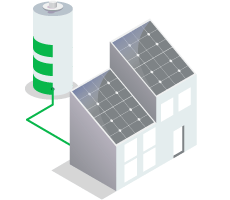back
Fossil fuels, although still dominant, have an increasingly heavy environmental impact. Oil, natural gas, and coal, derived from the decomposition of organic matter over millions of years, are used in many sectors, including electricity production, transportation, and heating. However, their massive exploitation depletes natural resources and generates greenhouse gas emissions, responsible for global warming. In the face of these challenges, renewable energies present themselves as a sustainable and environmentally friendly alternative. These energy sources, such as the sun, wind, water, or biomass, are inexhaustible and produce little or no polluting emissions. Their potential is immense, and they help reduce dependence on fossil fuels while preserving our planet for future generations.
Hydropower: A Force of Nature
Hydropower, using the movement of water to generate electricity, is one of the main sources of renewable energy. In France, dams and marine currents have been resources exploited for decades. In 2020, hydropower represented 49% of renewable electricity production, and France stands out in Europe for its major role in this sector.
Wind Energy: Capturing the Breath of the Wind

Wind energy is another key source of green energy. Wind turbines, installed both on land (onshore) and at sea (offshore), harness the kinetic energy of the wind. Although wind energy is intermittent, it is experiencing strong growth, particularly due to favorable climatic conditions. By 2030, the goal is to achieve 40% of renewable electricity production in France through wind energy.
Solar Energy: The Influence of the Sun

Solar energy, also intermittent, is one of the most promising. There are two main categories: photovoltaic solar energy, which generates electricity, and solar thermal energy, used to produce heat. In France, photovoltaic solar energy is experiencing strong growth, supported by falling panel prices and incentives for self-consumption.
Biomass: An Energy at the Heart of Nature ⬤

